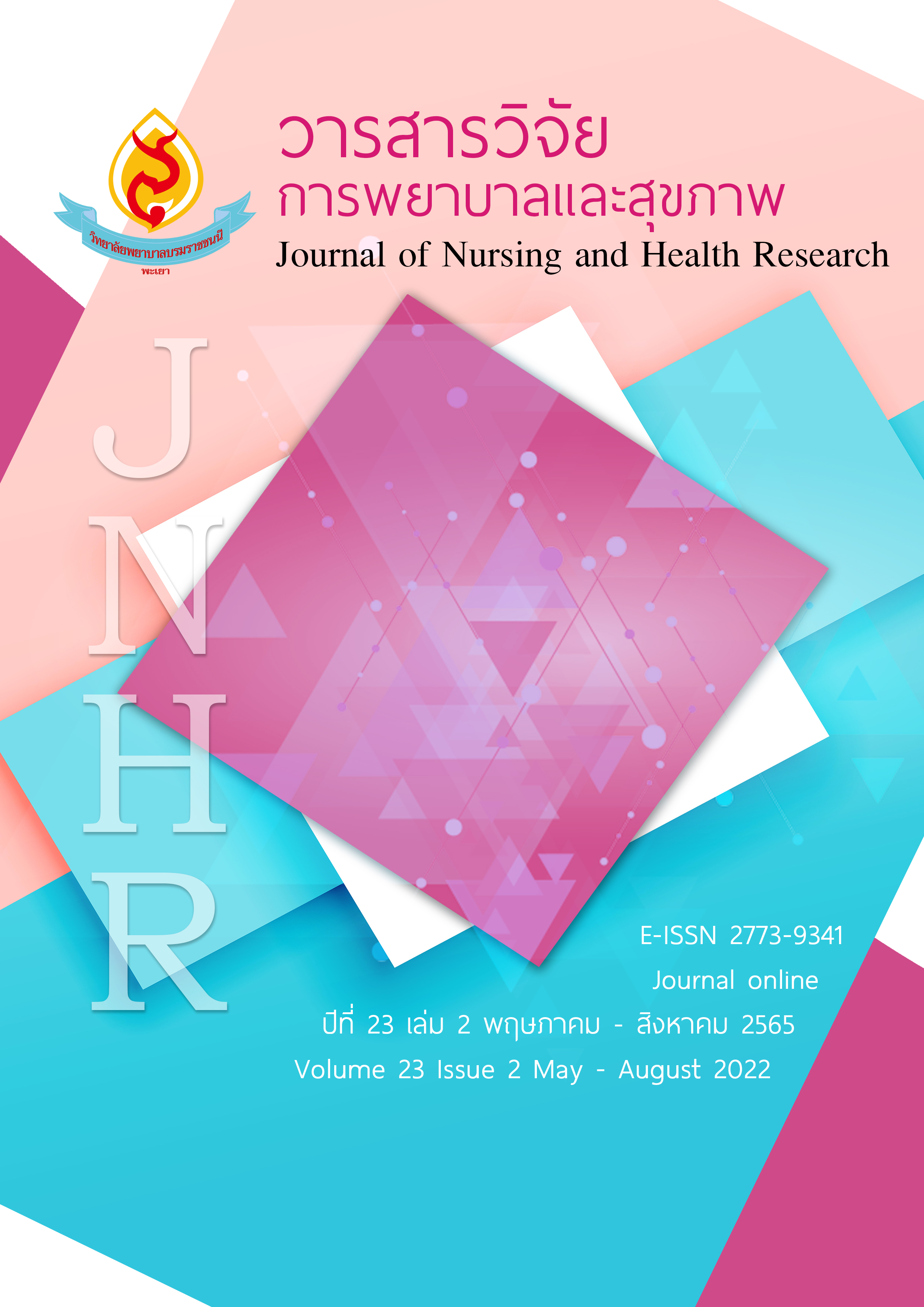สมรรถนะของพยาบาลวิชาชีพด้านการพยาบาลผู้ป่วยโรคโควิด-19: การทบทวนวรรณกรรมแบบกำหนดขอบเขต
คำสำคัญ:
สมรรถนะการพยาบาล, โรคโควิด-19 , พยาบาลวิชาชีพ , การทบทวนวรรณกรรมแบบกำหนดขอบเขตบทคัดย่อ
พยาบาลวิชาชีพมีบทบาทสำคัญในการดูแลสุขภาพของผู้ป่วยโรคโควิด-19 การเตรียมความพร้อมของพยาบาลวิชาชีพนอกจากจะมีผลต่อคุณภาพการพยาบาลแล้วยังส่งผลดีต่อความมั่นใจและความพร้อมในการให้การดูแลผู้ป่วยในภาวะที่มีการระบาดและภายหลังการระบาดของโรคโควิด-19 การพัฒนาความสามารถในการดูแลประชาชนที่ได้รับผลกระทบหรือมีความเสี่ยงต่อการติดเชื้ออย่างครอบคลุมและเป็นองค์รวมจึงเป็นสิ่งสำคัญ งานวิจัยนี้มีวัตุประสงค์ เพื่อทบทวนวรรณกรรมแบบกำหนดขอบเขต องค์ประกอบสมรรถนะการพยาบาลผู้ป่วยโรคโควิด-19 สำหรับพยาบาลวิชาชีพ ที่ตีพิมพ์ตั้งแต่ สิงหาคม พ.ศ. 2563 ถึง มกราคม 2565 การทบทวนใช้ข้อมูลจาก 4 ฐานข้อมูล ประกอบด้วย (1) CINAHL (2) PubMed (3) Google scholar และ (4) ScienceDirect ผลการทบทวนวรรณกรรมแบบกำหนดขอบเขต พบว่า มีงานวิจัยจำนวน 6 ชื่อเรื่อง ที่มีคุณสมบัติตามเกณฑ์การทบทวนองค์ประกอบของสมรรถนะการพยาบาลผู้ป่วยโรคโควิด-19 มีความแตกต่างกันไปตามการศึกษา อย่างไรก็ตามสมรรถนะที่จำเป็นด้านการพยาบาลผู้ป่วยโรคโควิด-19 ที่มีแนวโน้มพบบ่อย ได้แก่ (1) ด้านการคัดกรองผู้ป่วย 2) ด้านการป้องกัน ควบคุม และการเฝ้าระวังการติดเชื้อ (3) ด้านความปลอดภัยและความมั่นคง (4) ด้านการพยาบาลผู้ป่วยและครอบครัว (5) สมรรถนะ
ด้านการสื่อสารและการประสานงาน (6) การบริหารจัดการและการทำงานเป็นทีม (7) ด้านวุฒิภาวะทางอารมณ์ และ
(8) ด้านจรรยาบรรณวิชาชีพ ดังนั้นผู้บริหารสถานศึกษาพยาบาลและผู้เกี่ยวข้องด้านการจัดการศึกษาสามารถ
นำผลการศึกษาครั้งนี้ไปเป็นแนวทางในการปรับปรุงหลักสูตรพยาบาลศาสตรบัณฑิตเพื่อเตรียมบัณฑิตพยาบาล
ให้พร้อมกับสถานการณ์ของโรคโควิด-19 ในปัจจุบัน
เอกสารอ้างอิง
ตรีญดา โตประเสริฐ. (2564). สมรรถนะพยาบาลวิชาชีพในการดูแลผู้ป่วยโรคติดต่ออุบัติใหม่ สถาบันบำราศนราดูร. วารสารสถาบันบำราศนราดูร, 15(1), 25-36.
สมพร สังข์แก้ว, ธีรนุช ห้านิรัติศัย, และบุญใจ ศรีสถิตนรากูร (2563). สมรรถนะพยาบาลวิชาชีพด้านการพยาบาลผู้ป่วยโรคติดต่ออุบัติใหม่. วารสารสภาการพยาบาล, 35(3), 69-86.
Arksey, H., & O'Malley, L. (2005). Scoping studies: towards a methodological framework. International Journal of Social Research Methodology, 8(1), 19–32. doi:10.1080/1364557032000119616.
Fukada, M. (2018). Nursing competency: definition, structure and development. Yonago acta medica, 61(1), 1-7. doi:10.33160/yam.2018.03.001.
Garside, J. R., & Nhemachena, J. Z. (2013). A concept analysis of competence and its transition in nursing. Nurse Education Today, 33(5), 541–545. doi:10.1016/j.nedt.2011.12.007
González-Gil, M. T., González-Blázquez, C., Parro-Moreno, A. I., Pedraz-Marcos, A., Palmar-Santos, A., Otero-García, L., …, Oter-Quintana, C. (2021). Nurses' perceptions and demands regarding COVID-19 care delivery in critical care units and hospital emergency services. Intensive Crit Care Nurs, 62, 102966. doi:10.1016/j.iccn.2020.102966
International Council for Nurses. (2019). Core Competencies in Disaster Nursing Version 2.0. Retrieved from https://www.icn.ch/sites/defau lt/files/inline-files/ ICN_Disaster-Comp-Report_WEB_final.pdf
Jia, Y., Chen, O., Xiao, Z., Xiao, J., Bian, J. & Jia, H. (2021). Nurses' ethical challenges caring for people with COVID-19: a qualitative study. Nursing Ethics, 28(1), 33–45. doi:10.1177/0969733020944453
Kan, T., Huang, Y., Liu, J. & Gui, L. (2018) Construction of core response competence index system for infectious disease emergencies among medical staff. Chinese Journal of Nursing, 53, 461–466.
Karnjuš, I., Prosen, M. & Ličen, S. (2021). Nurses' core disaster-response competencies for combating COVID-19 -a cross-sectional study. PloS One, 16(6), 1-3. doi: 10.1371/journal.pone.0252934
Lauck, S. B., Bains, V. K., Nordby, D., Iacoe, E., Forman, J., Polderman, J. & Farina, L. (2022). Responding to the COVID-19 pandemic: development of a critical care nursing surge model to meet patient needs and maximize competencies. Australian Critical Care, 35(1), 13-21. doi:10.1016/j.aucc.2021.02.009
Li, H., Dong, S., He, L., Wang, R., Long, S., He, F., . . . Feng, L. (2021). Nurses' core emergency competencies for COVID-19 in China: a cross-sectional study. International Nursing Review, 68(4), 524-532. doi: 10.1111/inr.12692
Ling, K. W. & Daily, E. K. (2016). Linking competency with training needs: session summary on disaster studies and evaluation, Session BO-17. Prehospital and Disaster Medicine, 31(1), 117–118. doi:10.1017/S1049023X15005580
Mao, X., Yang, Q., Li, X., Chen, X., Guo, C., Wen, X., ..., Loke, A. Y. (2021). An illumination of the ICN's core competencies in disaster nursing version 2.0: advanced nursing response to COVID-19 outbreak in China. Journal of nursing management, 29(3), 412–420. doi:10.1111/jonm.13195
Nagarajan, R. & Prabhu, R. (2015). Competence and capability: a new look. International Journal of Management, 6(6), 7-11.
Peiró, T., Lorente, L. & Vera, M. (2020). The COVID-19 crisis: skills that are paramount to build into nursing programs for future global health crisis. International Journal of Environmental Research and Public Health, 17(18), 6532. doi:10.3390/ijerph17186532
Pinho, L., Correia, T., Sampaio, F., Sequeira, C., Teixeira, L., Lopes, M., ..., Fonseca, C. (2021). The use of mental health promotion strategies by nurses to reduce anxiety, stress, and depression during the COVID-19 outbreak: a prospective cohort study. Environmental Research, 195, 110828. doi:10.1016/j.envres.2021.110828
Safadi, R., Jaradeh, M., Bandak, A. & Froelicher, E. (2010). Competence assessment of nursing graduates of Jordanian universities. Nursing & Health Sciences, 12(2), 147–154. doi:0.1111/j.1442-2018.2009.00507.x
Tzeng, H.M. & Yin, C.Y. (2006). Demands for religious care in the Taiwanese health system. Nursing Ethics,13(2), 163-179.
Vázquez-Calatayud, M., Regaira-Martínez, E., Rumeu-Casares, C., Paloma-Mora, B., Esain, A., & Oroviogoicoechea, C. (2022). Experiences of frontline nurse managers during the COVID-19: a qualitative study. Journal of Nursing Management, 30(1), 79–89. doi:10.1111/jonm.13488
World Health Organization. (2020). Critical preparedness, readiness and response actions for COVID-19: interim guidance. Retrieved March 24, 2020. from https://www.who.int /publications/i/item/critical-preparedness-readiness-and-response-actions-for-covid-19
ดาวน์โหลด
เผยแพร่แล้ว
รูปแบบการอ้างอิง
ฉบับ
ประเภทบทความ
สัญญาอนุญาต
ลิขสิทธิ์ (c) 2022 วารสารวิจัยการพยาบาลและสุขภาพ

อนุญาตภายใต้เงื่อนไข Creative Commons Attribution-NonCommercial-NoDerivatives 4.0 International License.



